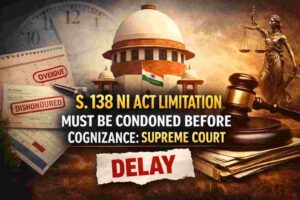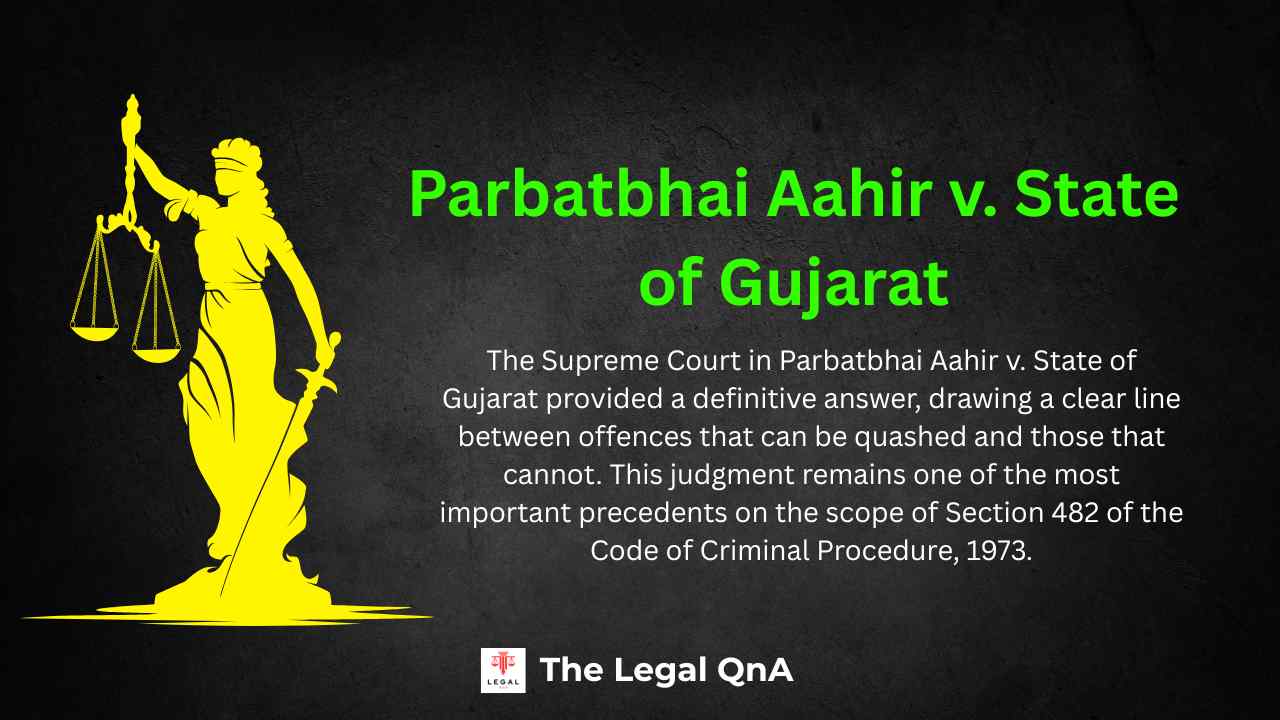This case is one of the most important judgments of the Supreme Court of India explaining the scope and limits of the High Court’s power under Section 482 of the Code of Criminal Procedure, 1973. It clarified when criminal proceedings can be quashed on the ground that the parties have settled their dispute, and when such quashing should not be permitted.
The decision, authored by Justice Dr. D.Y. Chandrachud, serves as a landmark precedent for distinguishing between private disputes that can be quashed and serious offences that affect public interest and must be prosecuted.
Facts of the Case
The complainant owned ancestral land measuring about 17 vighas in Jamnagar, Gujarat. This land was converted to non-agricultural use and divided into several plots. Among these, plots numbered 45 to 56 were jointly owned by the complainant and his family members.
The accused, led by Parbatbhai Aahir (the first appellant), approached the complainant to purchase one of the plots (plot no. 56). The accused offered Rs. 1.13 crore and paid Rs. 11 lakhs in cash. They requested photocopies of layout plans and photographs of the owners, saying they were required for registration purposes.
Later, the complainant discovered that the accused had forged a power of attorney in his and his siblings’ names and had executed sale deeds not only for plot no. 56 but also for plots 45 to 55 without their consent. The value of these plots was around Rs. 12.5 crores.
The complainant lodged an FIR alleging offences under Sections 384 (extortion), 467, 468, 471 (forgery and use of forged documents), 120-B (criminal conspiracy), and 506(2) (criminal intimidation) of the Indian Penal Code.
Proceedings Before the High Court
The accused approached the Gujarat High Court under Section 482 CrPC, seeking to quash the FIR on the ground that they had reached a settlement with the complainant. The complainant also filed an affidavit supporting the compromise.
However, the State opposed the quashing, pointing out that:
- The accused were absconding and warrants had been issued against them.
- They had criminal antecedents in several other cases involving forgery and cheating.
- The nature of allegations—land grabbing and document forgery—was serious and affected public confidence in the integrity of land transactions.
The High Court rejected the plea for quashing, holding that the offences were grave, not of a private nature, and had a potential impact on society.
Issue Before the Supreme Court
- Whether the High Court was justified in refusing to quash the FIR despite a compromise between the complainant and the accused.
Submissions
- For the Appellants (Accused): The counsel argued that the dispute was essentially of a civil nature, arising out of a land transaction, and that since the parties had amicably settled their differences, further prosecution would serve no purpose. Reliance was placed on earlier judgments like Gian Singh v. State of Punjab and Narinder Singh v. State of Punjab, where quashing had been permitted after settlement.
- For the State: The State’s counsel opposed the plea, arguing that the accused had engaged in a well-planned conspiracy to forge documents and grab land worth crores of rupees. Such offences could not be reduced to a mere private dispute, and quashing them on compromise would harm public interest.
Observations of the Supreme Court
Justice Chandrachud, speaking for the Bench, discussed the principles laid down in earlier judgments such as Gian Singh, Narinder Singh, State of Maharashtra v. Vikram Anantrai Doshi, and CBI v. Maninder Singh.
The Court summarized the principles governing Section 482 CrPC as follows:
- Section 482 preserves the inherent powers of the High Court to prevent abuse of process or secure the ends of justice.
- Quashing of a criminal case due to compromise is different from compounding an offence under Section 320 CrPC.
- While the High Court has wide powers, it must exercise them cautiously and in accordance with justice.
- Serious offences involving moral depravity, economic offences, and crimes affecting society cannot be quashed even if the victim and offender settle.
- Offences of a predominantly civil nature, such as those arising from commercial, partnership, or family disputes, can be quashed if the chances of conviction are remote and continuing the case would amount to injustice.
- Economic offences that affect the financial or social well-being of society are exceptions and should not be quashed even if the parties settle.
Court’s Findings
The Supreme Court held that the High Court was correct in refusing to quash the FIR. It observed that:
- The allegations against the accused involved a conspiracy, forgery, and creation of false documents to usurp valuable land.
- The accused had multiple criminal cases pending and had been absconding.
- The case was not a simple private land dispute but involved acts that undermined public confidence in property transactions and land records.
- Forgery and extortion are serious offences affecting society, not just private individuals.
The Court emphasized that allowing quashing in such cases would set a dangerous precedent and embolden fraudsters to misuse compromise settlements to escape criminal liability.
Decision
The Supreme Court dismissed the appeal, affirming the judgment of the Gujarat High Court. It held that the offences alleged were serious and could not be quashed merely on the basis of compromise.
Follow The Legal QnA For More Updates…















